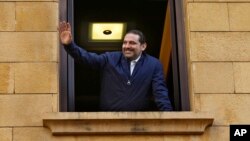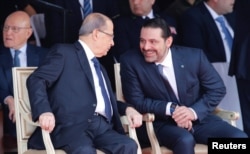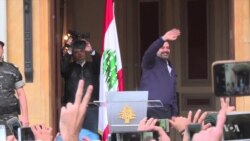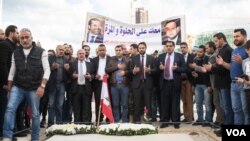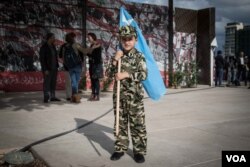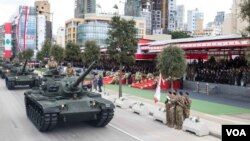At a military parade in the center of a city locked down by security and surrounded by the pomp and circumstance that typically come with commemorating Lebanon's Independence Day, Saad Hariri took his seat among the country's other leading politicians.
After flying in late Tuesday, his appearance Wednesday in Beirut marks a turning point in the ongoing saga that began with his mysterious – and some say forced – resignation from the role of prime minister while in Saudi Arabia on November 4.
Since then, the Lebanese have been left scratching their heads about his future and fearing for the future of the country itself. The shocking announcement and rumors that he was being held in Saudi Arabia plunged Lebanon into political turmoil.
WATCH: Hariri's Return
The nation now has him back, but exactly what his role will be remains unclear. Shortly after attending the Independence Day parade and following a meeting with President Michel Aoun, Hariri announced he would postpone his resignation.
Welcome return
Hariri's arrival came after he was whisked Friday from Saudi Arabia by Emmanuel Macron, president of France, the country from which Lebanon declared its independence in 1943.
Hariri was in Egypt on Tuesday, before arriving in Lebanon late in the day to pray at the tomb of his father, Rafik Hariri, who was prime minister before his assassination in a massive car bomb explosion in 2005.
Mohammed Abbas, one of the few spectators allowed to attend the heavily guarded parade, welcomed the return of Hariri, who like his father is seen as representative of the country's Sunni community.
"I have no political opinions, but I do have a personal one: Saad Hariri is prime minister of this country and I am happy he has returned. He could not resign outside of this country," the 20-year-old said.
"If he stays in the role [of prime minister] it will be better for Lebanon, both in terms of its economic and its social situation," Abbas said.
Hariri's resignation in Riyadh was widely perceived as a move by the Saudis, and especially their ascendant, Crown Prince Mohammed bin Salman, to counter the influence of Shia-dominated Iran and its Lebanese proxy, Hezbollah.
Saudi Arabia has denied the claim, as has Hariri. A tearful interview he gave from Riyadh last week did little to assuage fears.
His resignation sparked concerns the country would be thrown into chaos.
Some feared Saudi Arabia would attempt a Qatar-style economic blockade on a country that has struggled but somehow managed to remain relatively stable despite its volatile regional neighborhood, deeply divided politics, and the presence of about 1.5 million refugees.
Others feared worse, though talk of the kind of internal violence that scarred the country during its 15-year-civil war was quickly silenced by a strong show of unity in calling for Hariri's return.
Local media reports, not independently confirmed, say that upon formally meeting President Aoun at the parade, Aoun whispered, "Thank God for your safe return."
Resignation delayed
It was in Baabda Palace that Hariri announced earlier Wednesday that, upon the request of Aoun, he would be putting off his resignation "ahead of further consultations."
Reports quoted Hariri as calling for a "responsible dialogue" and a need to commit to the country's disassociation policy — a policy flaunted by Hezbollah's military support for the Syrian regime.
Hariri's partial rowing back on his resignation sparked speculation he may be able to remain in power, enabling the country's current national unity government, which includes Hezbollah and appeared to be crumbling, to remain intact until next May's elections.
Others see it as a blow to Saudi Arabia, which was perceived as punishing Hariri for compromising too much with Hezbollah, and the regional superpower's ambitions to counter Iranian influence.
In Lebanon, though, there is a palpable sense of relief. And amid crowds of Hariri supporters gathered near the city's center, what mattered most was that he was back home.
Supporters are galvanized by the memory of his father, whose slaying remains a big source of tension with Saudi Arabia and Hezbollah.
A U.N.-backed tribunal currently is trying a number of Hezbollah members in absentia for his murder, allegations Hezbollah rejects.
Abir Masri had just visited the tomb of Hariri's father, Rafik Hariri, a businessman who made his money in Saudi Arabia, and a politician who had enjoyed its backing.
"Rafik Hariri was our leader and he died in vain, and we will follow the Hariri family till the end," Masri said. "We were very scared for him and his situation, but now everyone is smiling here."
Looking forward
Around Masri, hundreds of people waved Lebanese flags and the blue flag of the Future Movement political party.
Music played and car horns honked, while young supporters broke into dance. Those gathered around Hariri's residence in Beirut's well-heeled downtown district got to see Hariri as he waved from the window.
Meanwhile, congratulations for Lebanon on its Independence Day flooded in from world leaders, including U.S. President Donald Trump, a backer of Saudi Arabia.
Just what the future holds, however, and whether the worst is over for now in Lebanon, remains distinctly opaque.
Unlike many other Hariri supporters who spoke to VOA, Eid Habach, from Baalbeck, voiced her fears that Saudi Arabia may have pressured Saad Hariri to resign.
Describing Hariri as the "love" of her life, Habach said she feared for his independence, and that of her country.
"Hariri will always be pressured, and in Lebanon there is little to reassure us about the future," she said.
In Photos: Lebanon Celebrates Independence Day, Hariri's Return




